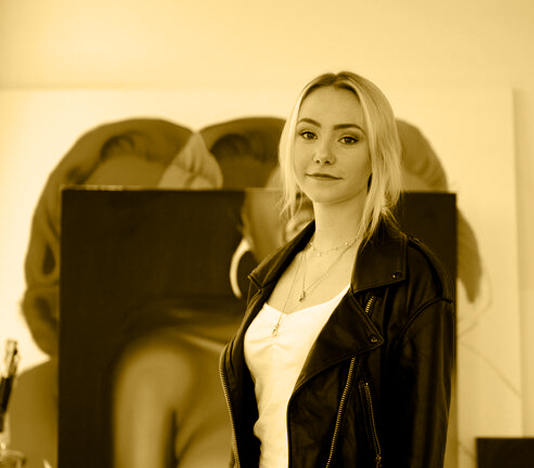Alexandra Grounds

Passing by a pop-up gallery in Manhattan’s Bowery last fall, it would have been tough not to notice the 6-by-4-foot oil painting of a tongue. Delusions of the Wild, which renders everything from taste buds to sublingual veins in vivid shades of pink, red and blue, was a showstopper at Alexandra Grounds’ solo exhibition. “It definitely caught people’s attention, which was the goal,” says the junior art major at Columbia University.
An emerging artistic voice, Grounds focuses largely on extreme close-ups and icons of femininity such as Grace Kelly and Marilyn Monroe. This summer, her “Quarantine Series,” featuring a roll of golden toilet paper and a bottle of Purell sanitizer, arose from a desire to capture the strange tenor of the times. But as the impact of the pandemic grew, Grounds decided to sell her prints to raise money for the nonprofit Feeding America. Her donations provided meals for some 20,000 people.
We spoke by phone with the artist at her parents’ house in Scottsdale, Arizona, where she was deciding whether to hunker down or return to New York to accept a Silver Arts Project studio space at the World Trade Center.
How did you get started as an artist?
I wasn’t painting all that much until I had class with [PEA Art Instructor] Tara Lewis my lower year. I convinced her to let me make a painting based on a Richard Phillips painting I’d seen on “Gossip Girl.” Then we invited Richard Phillips to Exeter, which was a dream come true. … Ms. Lewis helped me coordinate the sale of one of my paintings and I thought, ‘This is something I could actually do!’ I spent the next two years at Exeter changing my schedule around to take as many art classes as I could and just paint.
You often portray women in your work. What prompted that?
As a young woman, growing up in today’s society, I felt pressure to be sexy and dress in a certain way while also trying to achieve my academic and intellectual pursuits. Those things seem to contradict each other a bit within the professional world. Painting gave me an outlet to get my voice and my opinions out to people who wouldn’t necessarily hear them. Feminism is about equality of genders and basically evening the playing field between men and women. But in my opinion, this can take away a lot of how women identify themselves — their femininity. It empowers me to embrace that side of myself as well as my sexuality, so I portray that through my work. It’s a different take on feminism.
Can you tell us about your process?
At first, a lot of my stuff was about aesthetics. I had messages, but I was still focused on creating a beautiful image. As I matured and developed more as an artist, including finding my artistic voice, I wanted to get into more intimate imagery that was even grotesque at times and see how far into detail I could go. … I’m trying to get as raw as possible in the human experience and get beyond the beautiful surface of everything.
— Sarah Zobel
Editor’s note: This profile first appeared in the fall 2020 issue of The Exeter Bulletin.


